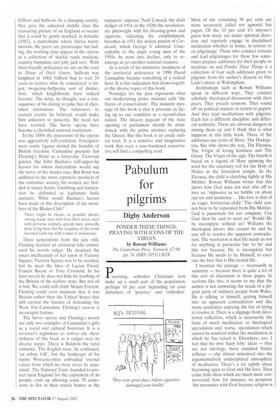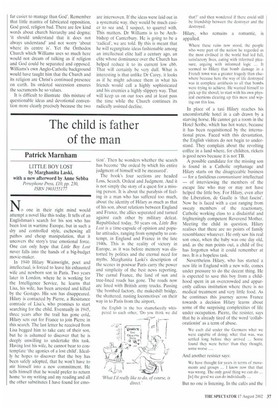Pabulum for pilgrims
Digby Anderson
PONDER THESE THINGS: PRAYING WITH ICONS OF THE VIRGIN by Rowan Williams The Canterbury Press, Norwich, £7.99, pp. 74, ISBN 185311362X Practising, orthodox Christians now make up a small part of the population, perhaps 10 per cent depending on your definition of 'practice' and 'orthodox'. Most of the remaining 90 per cent are more accurately called not agnostic but pagan. Of the 10 per cent it's anyone's guess how many are under spiritual direction and regularly engage in disciplined meditation whether at home, in retreat or on pilgrimage. Those who conduct retreats and lead pilgrimages for these few sometimes prepare addresses for their people to meditate on and Ponder These Things is a collection of four such addresses given to pilgrims from the author's diocese to Our Lady's shrine at Walsingham.
Archbishops such as Rowan Williams speak in different ways. They conduct scholarly theological discussions with their peers. They preach sermons. They sound off on political matters in letters to papers. And they lead meditations with pilgrims. Each has a different discipline and different authority. There are obvious dangers in mixing them up and I think that is what happens in this little book. Three of the addresses use icons of Mary, The Hodegetria, She who shows the way, The Eleousa, The Virgin of loving kindness and The Orans, The Virgin of the sign. The fourth is based on a legend of Mary spinning the wool for the sanctuary veil for the Holy of Holies in the Jerusalem temple. In the Eleousa, the child is clutching tightly at His Mother. Rowan Williams writes that this shows how God does not wait afar off to love us, 'impassive as we babble on about our sin and penitence ... His love is that of an eager, boisterous child.' The child cannot bear to be separated from His Mother. God is passionate for our company. Can God then be said to need us? Would He be incomplete without us? Williams the theologian knows this cannot be and he sets off to resolve the apparent contradiction. The resolution is that He needs us not for anything in particular but `to be' and this not because He is incomplete but because He needs to be Himself, to exercise the love that is His eternal life.
I mention the passage — necessarily in summary — because there is quite a lot of this sort of discussion in these pages. In sections like this, it seems to me that the author is not answering the needs of a pilgrim party of ordinary people from Wales. He is talking to himself, getting himself into an apparent contradiction and like many academics enjoying the fun of trying to resolve it. There is a slippage from devotional reflection, which is necessarily the basis of much meditation, to theological speculation and, worse, speculation which cannot be resolved within the meditation in which he has raised it. Elsewhere, too. I feel that his own 'hairy lefty' ideas — they are not ideology, more standard Sixties reflexes — slip almost unnoticed into the argumentatively undisciplined atmosphere of meditation. There's a lot rightly about becoming open to God and His love. Then come little ideas which are much more controversial, how, for instance, we postpone 'the encounter with God because religion is far easier to manage than God'. Remember that little mantra of fabricated opposition, God good, religion bad. There are few kind words about church hierarchy and dogma; 'it should understand that it does not always understand' and not worry 'about where its centre is'. Yet the Orthodox Church which Williams uses so much here would not dream of talking as if religion and God could be separated and opposed. Williams's own Anglo-Catholic background would have taught him that the Church and its religion are Christ's continued presence on earth. Its ordered succession ensures the sacraments he so values.
It is difficult to illustrate this mixture of questionable ideas and devotional convention more clearly precisely because the two are interwoven. If the ideas were laid out in a systematic way, they would be much easier to see and. I suspect, to quarrel with. This matters. Dr Williams is to be Archbishop of Canterbury. He is going to be a 'radical', we are told. By this is meant that he will regurgitate ideas fashionable among an intellectual elite half a century ago, an elite whose dominance over the Church has helped reduce it to its current low ebb. That will certainly be very dull. What is interesting is that unlike Dr Carey, it looks as if he might advance them in what his friends would call a highly sophisticated and his enemies a highly slippery way. That will keep us on our toes and at least pass the time while the Church continues its radically assisted decline.































































 Previous page
Previous page